hidden in the shadows
of San Damiano,
spent her jars of
precious nard
witnessing to the
Passion.
Daily she recited what
Francis carried
after worm met Seraph
in the cocoon of La Verna,
and was given
bloody wings,
to flutter and spatter
forgiveness
for two more years.
But she lived on
and on
and on
bereft
of the comfort
of communion
with her twin flame.
Did she long to
set the world afire
with her preaching?
This was not given.
Did she ache to part
with the convent garden
and bear the Child
and Master Healer
into the world?
This was not given.
Hers was the "better part"
(Francis must have consoled
him again and again).
She was to sit
at the Lord's feet,
at the foot of His Cross,
drinking in
every word and sigh.
She was the
enduring oil lamp,
now eternal flame.
She was the seed
fallen to the ground
of her own
cloister garden,
blossoming sturdy
and now evergreen.
Entrance Antiphon for the feast of St. Clare
(Franciscan Supplement to the Roman Missal)
Today, August 11, we celebrate the feast day of Saint Clare of Assisi (1193-1253), friend and follower of Saint Francis, mystic, miracle worker, and foundress of the Order of the Poor Clares. The 41 years of Clare’s religious life are a model of piety and sanctity. She demonstrated an indomitable resolve to lead the simple, literal gospel life as Francis taught her, resisting worldly pressures to dilute the rules of her order. Through her commitment to the Gospel, and her unwavering life of prayer, Clare established a new manner for women to live in community and serve the Lord—one of poverty and humility, service and contemplation, and generous concern for others. Saint Clare continues to inspire us today through the example set forth in her life, as well as her writings which survive her.
Clare (a name meaning “shining with light”) was born in the town of Assisi, a town made famous by her contemporary and friend, Saint Francis. Born to a noble family, Clare was drawn to the religious life from an early age. Her parents, however, disapproved of this intention, and repeatedly arranged marriages for her. Having consecrated herself in virginity to Christ, Clare refused each arranged marriage, and at age fifteen stole away from home after hearing Saint Francis preach a Lenten service at the Church of Saint George. She secretly met with Saint Francis, asking him to her to live “after the manner of the Holy Gospel.” Through his spiritual guidance, she felt strong enough to leave her worldly connections, including her wealth and family, and devote her life to Christ. On Palm Sunday of that year, 1212, she came to the cathedral of Assisi for the blessing of palms, but when the others went up to the altar-rails to receive their branch of green, a sudden shyness kept Clare back. The bishop saw it and came down from the altar and gave her a branch.
Clare, her resolve strengthened, left home the following evening and hurried through the woods toward the chapel of Portinucula where Saint Francis had established a small community. On the road, she met a procession of monks, who wordlessly traveled by torchlight to the chapel. There, Saint Francis and the brothers prayed over her. Before the altar of Our Blessed Mother (the chapel of Mary of the Angels), Clare laid her fine cloak and jeweled belt, replacing it with a robe of coarse cloth and a belt of rope. Saint Francis sheared her hair into the style of monks, and then having no nunnery, took her at once for safety to the Benedictine convent of Saint Paul, where she was affectionately welcomed. Her family, especially her father, was distressed by her actions, and stormed the convent to bring her home. So strong was her desire to stay with the Lord, she resisted their physical assaults, clinging to the convent alter, and unable to be moved. She finally bared her shorn head, declaring herself called to the service of Christ, and re-affirming that He would be her spouse. Her family eventually relented, and Saint Francis had her moved to the nunnery of Sant Angelo di Panzo, where her sister Agnes, a child of fourteen, joined her. Of course, their father, again, reacted poorly, causing the sisters (and the nunnery be extension) more difficulty. Eventually, Agnes' constancy was victorious, and in spite of her youth, Francis gave her the habit.
Sisters Clare and Agnes were housed in a small and humble reed hut, adjacent to the church of Saint Damian, on the outskirts of Assisi, and in 1215, when Clare was about twenty-two, he appointed her superior and gave her his rule to live by. She was soon joined by her mother and several other women—sixteen in total, although their numbers rapidly grew. Each woman—many from noble lineage-- had all felt the strong appeal of poverty and sackcloth, and without regret gave up their titles and estates to become Clare's humble disciples. Within a few years convents were founded in the Italian cities of Perugia, Padua, Rome, Venice, Mantua, Bologna, Milan, Siena, and Pisa, and also in various parts of France and Germany. Saint Agnes of Bohemia, daughter of the King of Bohemia, established a nunnery of this order in Prague, and took the habit herself. Clare wrote frequent letters to the abbesses of other convents, including to Saint Agnes, thoughtfully shepherding the growth of the order throughout Europe.
The Order of San Damiano, or the "Poor Clares" as they came to be known, practiced austerities which until then were unusual among women. They went barefoot, slept on the ground, observed a perpetual abstinence from meat, and remained consistently in silence, speaking only when obliged to do so by necessity or charity. Clare herself considered this silence desirable as a means of avoiding the innumerable sins of the tongue, and for keeping the mind steadily fixed on God. Not content with the fasts and other mortifications required by the rule, she wore next her skin a rough shirt of hair, fasted on vigils and every day in Lent on bread and water, and on some days ate nothing. Preferring to sleep on the ground or on a hard board, Saint Francis or the local bishop of Assisi had to command at times her to lie on a mattress and to take a little nourishment every day. The Poor Clares possessed no property, even in common, subsisting only on daily contributions. When even the pope tried to persuade her to mitigate this practice, and even offered a sponsored yearly allowance to be provided to the convent, Clare showed her characteristic firmness and devotion to austerity: “I need to be absolved from my sins, but I do not wish to be absolved from the obligation of following Jesus Christ.”In 1228, two years after Francis' death, the Pope granted the Assisi sisterhood a Privilegium paupertatis, or “Privilege of Poverty.” This papal declaration asserted that the Poor Clare communities could not be constrained by anyone to accept possessions, stating: "He who feeds the birds of the air and gives raiment and nourishment to the lilies of the field will not leave you in want of clothing or of food until He come Himself to minister to you for eternity." The convents in Perugia and Florence asked for and received this privilege, whereas others thought it more prudent to moderate their poverty. Thus began the two observances which have ever since been perpetuated among the Poor Clares: the Urbanists (who follow a mitigated rule granted by Pope Urban IV in 1263) and those who more fully embody the spirit and tradition of Francis. To preserve this practice, Saint Clare drew up another rule stating that the sisters should possess no property, whether as individuals or as a community. Two days before she died, this rule asserting the Privilege of Property was approved by Pope Innocent for the convent of Saint Damian.
Clare governed the convent at Saint Damian with humility and continuity from the day when Francis appointed her abbess until her death, a period of nearly forty years. Her every action belayed her desire to be beneath all the rest, serving at table, tending the sick, washing and kissing the feet of the lay sisters when they returned footsore from begging. Her modesty and humility were such that after caring for the sick and praying for them, she often had other sisters give them further care, that their recovery might not be imputed to any prayers or merits of hers. Clare's hands were forever willing to do whatever she could that could help Francis and his friars. She frequently said to him: "Dispose of me as you please. I am yours, since I have given my will to God. It is no longer my own." She would be the first to rise, ring the bell in the choir, and light the candles; she would come away from prayer with radiant face. She further arose numerous times during the night to check on her sisters, replacing the blankets of those who may have fallen to the floor.
Clare was sick and suffered great pains for the last 27 years of her life, but she said that no pain could trouble her. So great was her joy in serving the Lord that she once exclaimed: "They say that we are too poor, but can a heart which possesses the infinite God be truly called poor?" We should remember this miracle of the Blessed Sacrament when in Church. Then we will pray with great Faith to Jesus in the Holy Eucharist: ‘Save me, O Lord, from every evil - of soul and body.’"
Clare was "an ardent seraph" before the most Blessed Sacrament -- she looked to the Lord in the Eucharist as her dearest Love. She received Jesus in Holy Communion as often as she was permitted. One day after she had received Holy Communion, the Child Jesus came to visit her. He lay in her arms and covered her with kisses.
In speaking of Eucharistic Adoration, Saint Clare said, "Gaze upon Him, consider Him, contemplate Him, as you desire to imitate Him." Due to her great zeal and deep devotion for the Holy Eucharist, Clare came to resemble that which she consumed and gazed upon so frequently during her life. Pope John Paul II said of Saint Clare: "her whole life was a Eucharist because … from her cloister she raised up a continual ‘thanksgiving' to God in her prayer, praise, supplication, intercession, weeping, offering and sacrifice. She accepted everything from the Father in union with the infinite ‘thanks' of the only begotten Son."
Numerous miracles are attributed to her prayers and intercessions. Despite the vow of poverty, and complete dependence on alms, the food stores never ran dry. Saint Clare experienced her own "multiplication of the loaves" when on another occasion, she fed 50 sisters and all the Franciscan friars with a single loaf of bread. Clare could bless an empty vessel, and it would promptly fill with olives, oil, or other sustenance. Her sign of the cross over a sick person was enough to cure them. She was once victim to a heavy door falling on top of her, trapping her beneath its weight. When her sisters removed it, she was miraculously unharmed, stating instead it felt as a blanket had been on her, and equating the door to the wood of the cross. At times when she would pray in chapel, Clare was observed to be surrounded by a warm light of various hues.
One Christmas Eve Clare was too ill to rise from her bed to attend Mass at the new Basilica of Saint Francis. Although she was more than a mile away, she saw Mass “broadcast” on the wall of her dormitory. So clear was the vision that the next day she could name the friars at the celebration. It was for this last miracle that she has been named patroness of television. Her patronage of eyes and against their problems likely developed from her name, which has the meaning of “clearness, brightness, and brilliance” – the qualities of healthy eyes.
Saint Clare’s prayers were reported to be both powerful and efficient, and history has recorded their impact. In 1244, for example, during a war waged against the Pope and the Holy See by Emperor Frederick II, his army of Saracens was sent to destroy Assisi. The Church of Saint Damien, standing outside the city walls, was one of the first objectives. While the invaders were scaling the convent walls, Clare—herself very ill-- had herself carried out to the gate and raised the Blessed Sacrament in her hands to the sight of the enemy. Prostrating herself before it, she prayed aloud: "Does it please Thee, O God, to deliver into the hands of these beasts the defenseless children whom I have nourished with Thy love? I beseech Thee, good Lord, protect these whom now I am not able to protect." At that moment, she heard the voice of a child saying, "I will have them always in My care." She prayed again, for the city, and again the voice came, reassuring her. She then turned to the trembling nuns and said, "Have no fear, little daughters; trust in Jesus." At this, a sudden terror seized the invading forces, and then retreated in fear.
Soon afterward, one of Emperor Frederick's generals laid siege to the city of Assisi for many days. Clare told the sisters of her convent that they, as they had received their bodily necessities from the city for many years, now owed it all the assistance in their power. Together with her sisters, she covered herself with ashes and prayed day and night for the safe release of the city from siege. As she wrote, following their prayers, "God in his mercy so made issue with temptation that the besiegers melted away and their proud leader with them, for all he had sworn an oath to take the city."
After 27 long years of illness, Clare's life neared its end in the summer of 1253. Pope Innocent IV traveled to Assisi to give her absolution, remarking, "Would to God I had so little need of it!" To her nuns she said, "Praise the Lord, beloved daughters, for on this most blessed day both Jesus Christ and his vicar have deigned to visit me." On her deathbed, Clare was surrounded by ranking officials of the Church, many of whom traveled great distances to be with her, as they considered her a saint in life. Her sister Agnes was with her, as well as three of the early companions of Saint Francis- Leo, Angelo, and Juniper. Together, they read aloud the Passion according to John, as they had read at the death-bed of Francis himself, twenty-seven years beforehand. Following the reading of the Passion, Clare is reported to have said to herself: "Go forth without fear, Christian soul, for you have a good guide for your journey. Go forth without fear, for He that created you has sanctified you, has always protected you, and loves you as a mother." Witnesses reported that Saint Francis, himself, led her into the light of heaven.
Pope Innocent IV presided at her funeral. Her body was buried at San Damiano Church, and later translated to the Basilica of Santa Chiara in the town of Assisi. Her incorrupt body lies today in the Basilica of Saint Clare of Assisi. Along with her relics—including the simple robes she wore—her body is venerated there, housed in a glass case. In 1804 a change was made in the rule of the Poor Clares, originally a contemplative order, permitting these religious to take part in active work. Today there are houses of the order in North and South America, Palestine, Ireland, England, as well as throughout Europe.
The life of Saint Clare is one of simple focus. From an early age she dedicated herself to the Lord, and through a lifetime of humility, service, obedience, patient suffering, prayer, and contemplation, Clare refined her being into a “model of perfection.” Miracles aside, the daily life of poverty and labor resonates today, reminding us of the Lord’s call to us: "He who is last shall be first.” Saint Clare depended completely on the Lord, looking to the Eucharist as a source of joy and sustenance, and never taking the gifts of God for granted. Today, on her feast day, we might slow down and contemplate our relationship with the Lord, our dependence, the value we place upon our Eucharistic gift and privilege. How well do we live the advice of Saint Clare: "Totally love Him, Who gave Himself totally for your love."
Selection Quotations of Saint Clare:
“Gaze upon Christ,
consider Christ,
contemplate Christ,
as you desire to imitate Christ.”
"Since our bodies are not of brass and our strength is not the strength of stone, but instead we are weak and subject to corporal infirmities, I implore you vehemently in the Lord to refrain from the exceeding rigor of abstinence which I know you practice, so that living and hoping in the Lord you may offer Him a reasonable service and a sacrifice seasoned with the salt of prudence."
"Place your mind
before the mirror of eternity!
Place your soul in the brilliance of glory!
and transform your entire being
into the image of the Godhead Itself
through contemplation."
"I come, O Lord, unto Thy sanctuary to see the life and food of my soul. As I hope in Thee, O Lord, inspire me with that confidence which brings me to Thy holy mountain. Permit me, Divine Jesus, to come closer to Thee, that my whole soul may do homage to the greatness of Thy majesty; that my heart, with its tenderest affections, may acknowledge Thine infinite love; that my memory may dwell on the admirable mysteries here renewed every day, and that the sacrifice of my whole being may accompany Thine."
"He, Christ, is the splendor of eternal glory, "the brightness of eternal light, and the mirror without cloud."
“What you hold, may you hold.
What you do, may you do and not stop.
But with swift pace, light step, unswerving feet,
so that even your steps stir up no dust,
may you go forward
securely, joyfully, and swiftly,
on the path of prudent happiness,
believing nothing,
agreeing with nothing
that would dissuade you from this commitment
or place a stumbling block for you on the way,
so that nothing prevents you from offering
your vows to the Most High in the perfection
to which the Spirit of the Lord has called you.”
“For the Lord Himself has placed us as a model, as an example and mirror not only for others, but also for our sisters whom the Lord has called to our way of life as well, that they in turn might be a mirror and example to those living in the world.
Since the Lord has called us to such great things that those who are a mirror and example to others may be reflected in us, we are greatly bound to bless and praise God and to be strengthened more and more to do good in the Lord."
O Glorious Saint Clare! God has given you the power of working miracles continually, and the favor of answering the prayers of those who invoke your assistance in misfortune, anxiety, and distress. We beseech you, obtain from Jesus through Mary His Blessed Mother, what we beg of you so fervently and hopefully, if it be for the greater honor and glory of God and for the good of our souls. Amen.









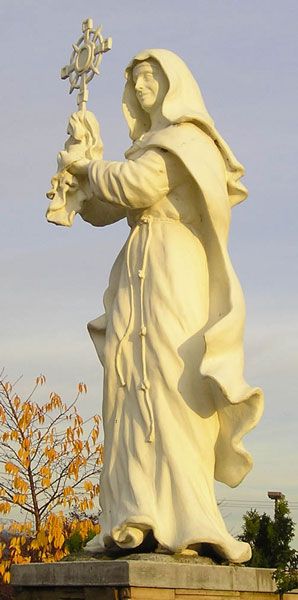













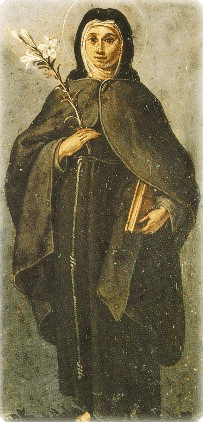

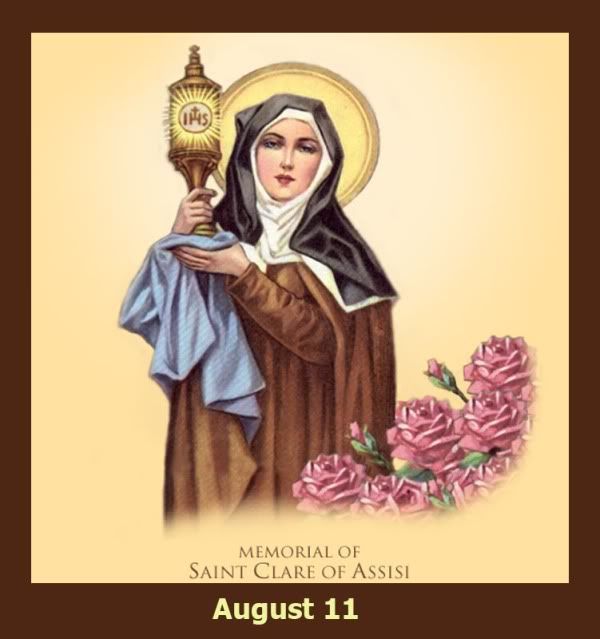



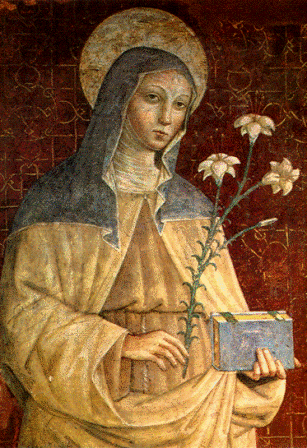
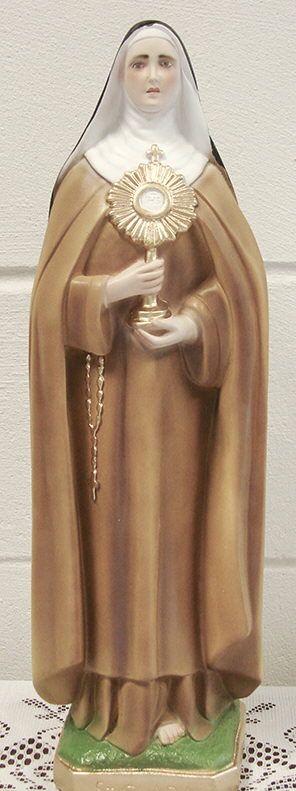


0 comments:
Post a Comment
Thanks for leaving a comment. If you wish to submit a prayer request, however, please do so above, using the "Contact" tab.